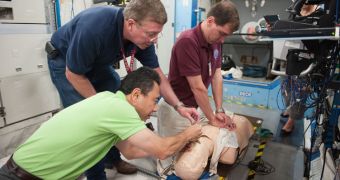As Japan was being severely affected by the March 11 tremor and tsunamis, a Japanese astronaut was carrying on with his preparations for a six-month stay in space at a facility in the United States. Though given the option, the would-be space flyer decided to carry on with the mission.
Eleven days ago, a magnitude 9.0 earthquake struck some 80 miles (128 kilometers) offshore, at a depth of only 24.4 kilometers (15.2 miles), The epicenter of the devastation was established to be some 373 kilometers (231 miles) northeast of Tokyo.
Subsequent tsunamis caused a lot of damage on the coastlines, including massive devastation at the Fukushima Daiichi nuclear power plant, some 250 kilometers (155 miles) from Tokyo.
As this was happening, Japanese astronaut Satoshi Furukawa, 46, was in Houston, Texas, completing his training at the NASA Johnson Space Center (JSC). He is due to launch to the International Space Station (ISS) for a six-month stay on May 30.
The Japan Aerospace Exploration Agency (JAXA) flight engineers will be accompanied to low-Earth orbit by NASA astronaut Mike Fossum and Russian cosmonaut Sergei Volkov, of the Russian Federal Space Agency (RosCosmos).
The three will launch aboard a Soyuz space capsule. The spacecraft will celebrate its 110th flight on this occasion, which will mark the beginning of Expedition 28 as the crew arrives at their destination.
“Our thoughts and prayers are with those that suffer a great deal of damage from the big earthquake in Japan. We are with you. People all over the world are with you,” Furukawa said in a press release yesterday, March 21, at the JSC.
“I'd like to do whatever I can to contribute to science for those that have suffered from the damage, and all the Japanese [people], all the people all over the world,” he went on to say, quoted by Space.
“We've mostly been giving him a bit of room. Especially in the first days after the disasters struck, he was hungry for news of his family, friends and colleagues,” Fossum added.
“So, we've been a sympathetic ear, but he's more hungry to get the news, so we give him a bit of space. It's kind of the same thing we do on orbit – that time that you have to cope with personal things,” the astronaut explained.

 14 DAY TRIAL //
14 DAY TRIAL //